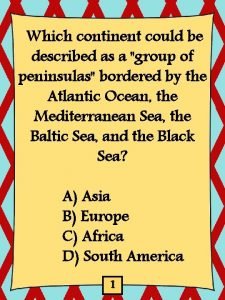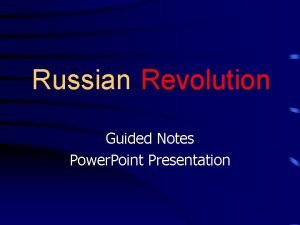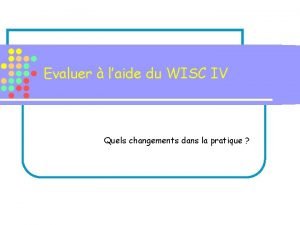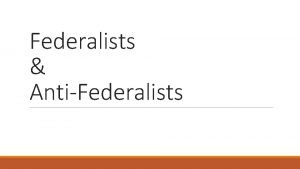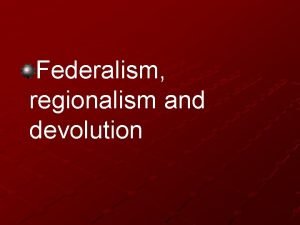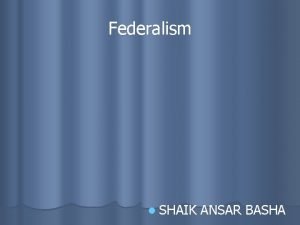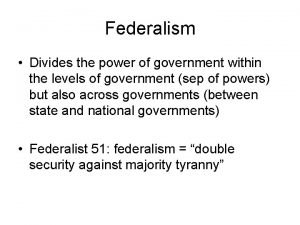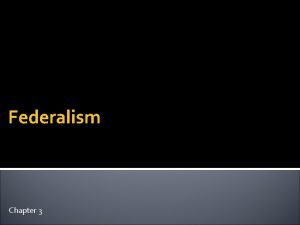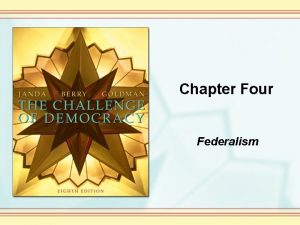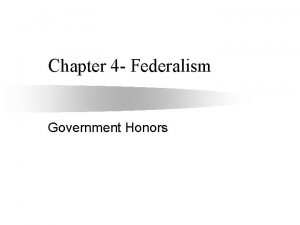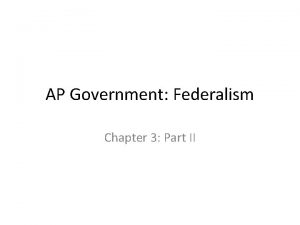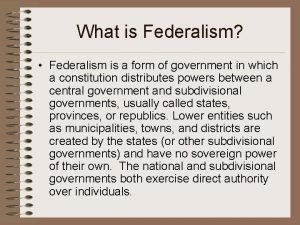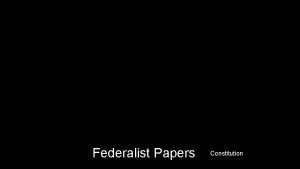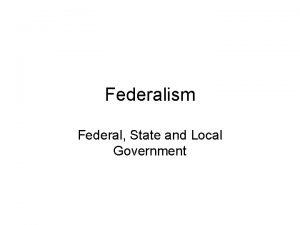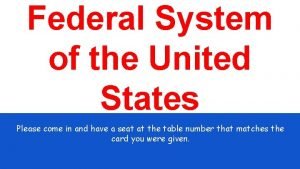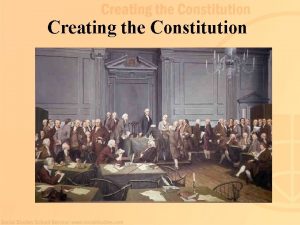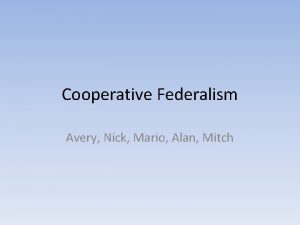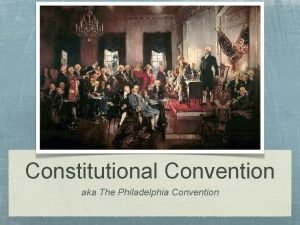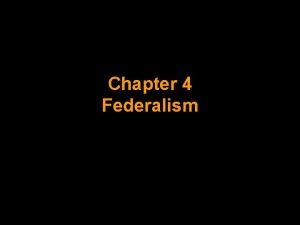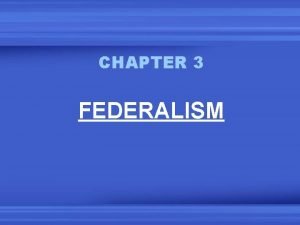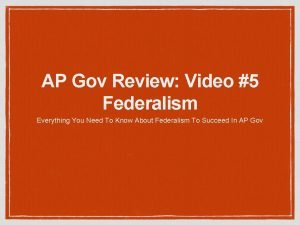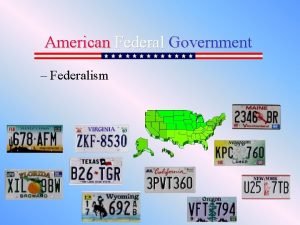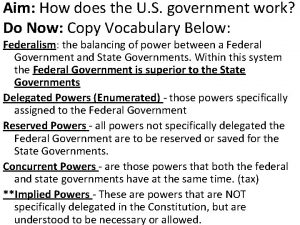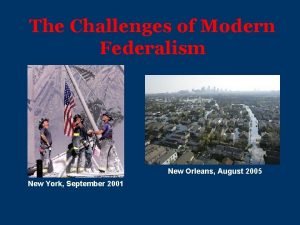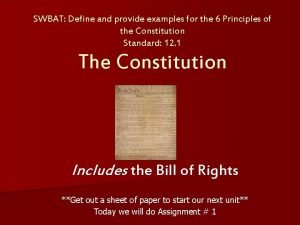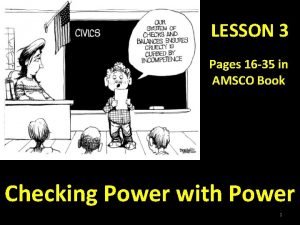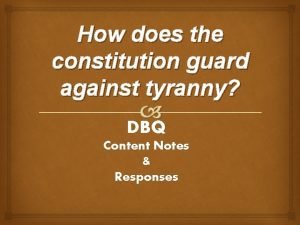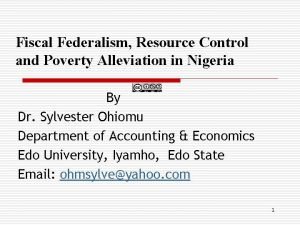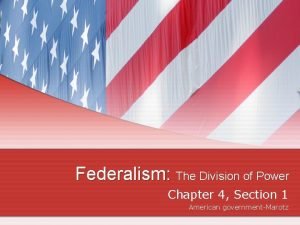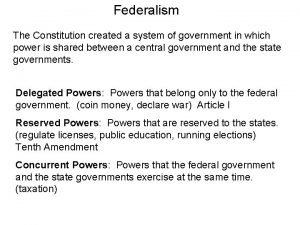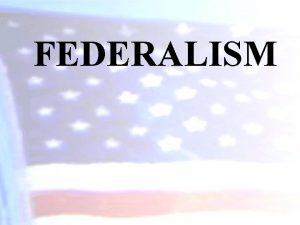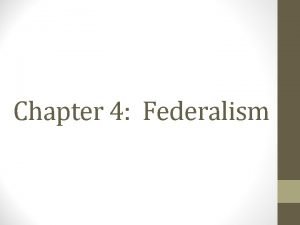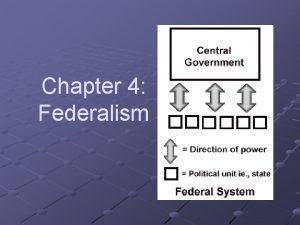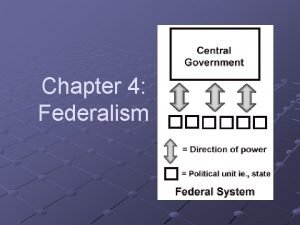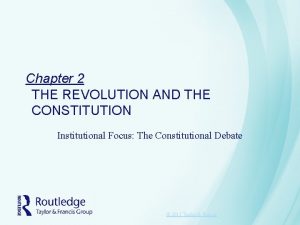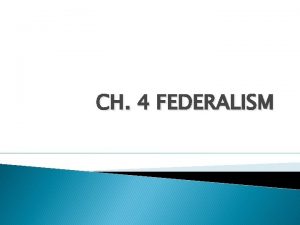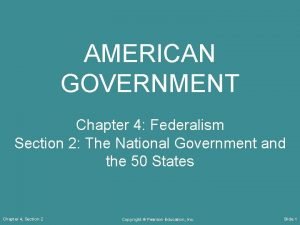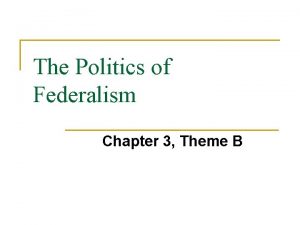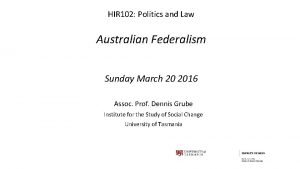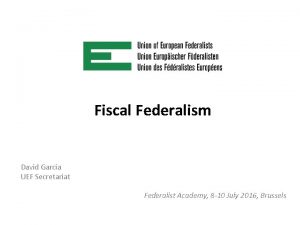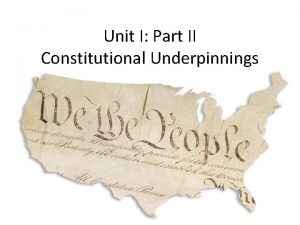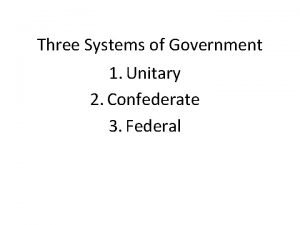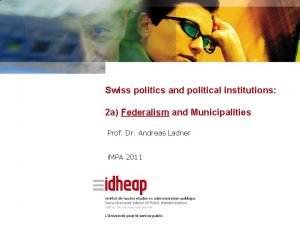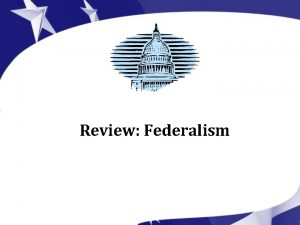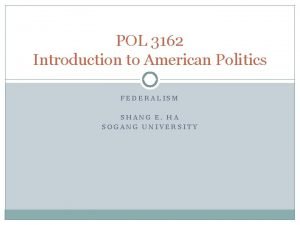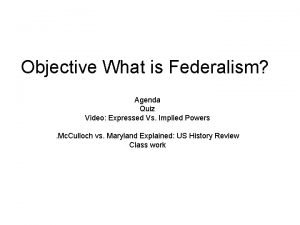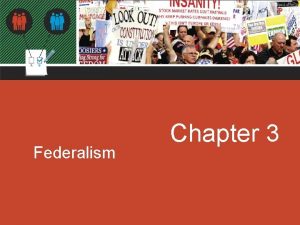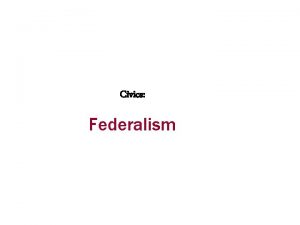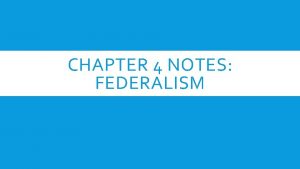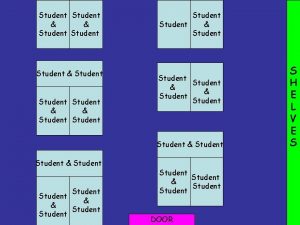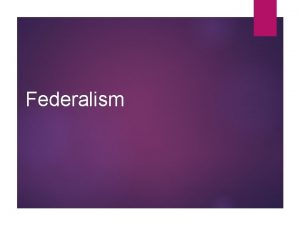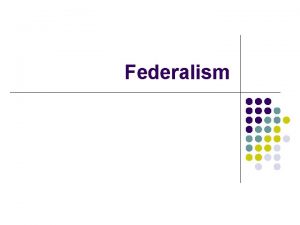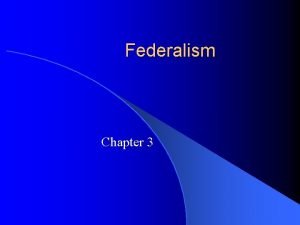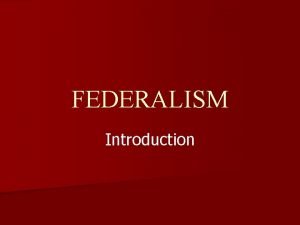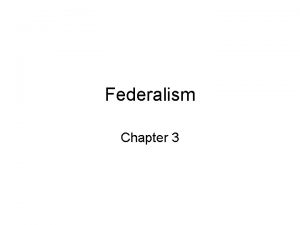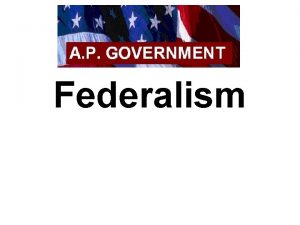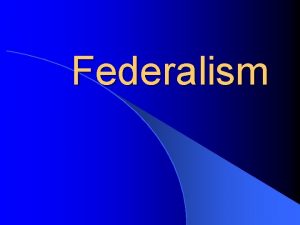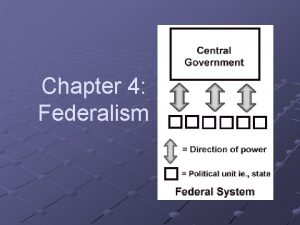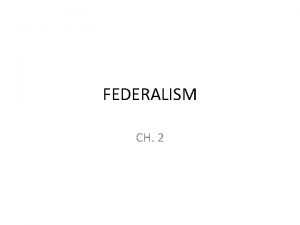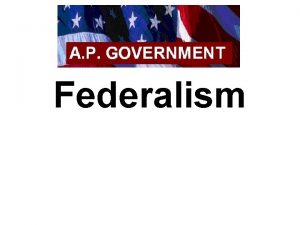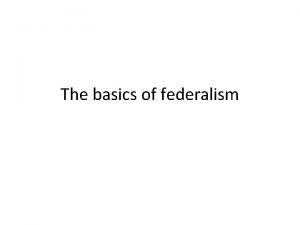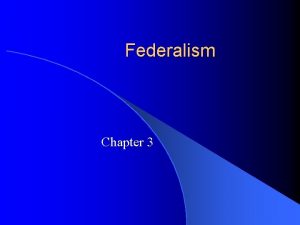RUSSIA STUDENT NOTES 2 FEDERALISM IN RUSSIA Russian





















































- Slides: 53

RUSSIA STUDENT NOTES - 2

FEDERALISM IN RUSSIA • Russian Federation - current regime consisting of 89 administrative units, including 2 federal cities, Moscow and St. Petersburg • So many ethnic CLEAVAGES: Tartars, Ukrainians, Armenians, Chuvashes, Bashkis, Byelorussians, Moldavians • 21 of which are ethnically non-Russian by majority • Some have wanted independence, Kremlin induces with trade • Each region is bound by treaty to the Federation, not all have officially signed on (Chechnya) • Many republics ruled themselves independently, but Putin has cracked down on this • Attempted Russification back in the day • Constitution vague on independent powers of regional units • Putin ended direct election of the 83 regional governors (2005), they are now nominated by the president and confirmed by the regional legislatures

CLEAVAGES �Biggest Cleavage is Nationality 80% are Russian Tatar = 3. 8% (Muslim) Ukrainian = 2% Bashkir = 1. 2% Chuvash = 1. 1% Other = 12. 1% �Because of structure of federation, ethnicity tends to be coinciding with region and often religion too �Chechnya - primary Muslim region has fought for independence

Chechnya • Primarily Muslim region of Russia • Contains some valuable resources, such as oil fields • Independence movement WAS strong, and Russian government has struggled historically to keep Chechnya region within its control • Chechens have reverted to terrorist tactics including taking over a heavily attended Russian theater and in 2004 the seizure of a school that resulted in the deaths of over 350 people, mostly children

RELIGIOUS MINORITIES

• Kadyrov, 41, a former separatist fighter who is now a staunch ally of Vladimir Putin, was sanctioned in December by the US Treasury over alleged human rights abuses, including involvement in extrajudicial killings. Facebook, which also owns Instagram, said the US decision meant it was legally obliged to deactivate his accounts.

Political Structure • Why does Russia have asymmetric federalism? What purpose does it serve? • To deal with ethnic/regional cleavages; an attempt to keep them from seeking independence • Republics have the right to establish their own official language and have their own constitution • Central govt was weak under Yelstin, so many ruled themselves almost independently Chechen strongman Ramzan Kadyrov said men living in Russia's predominantly Muslim region can take as many as four wives, even though polygamy is banned in the country.

POLICYMAKING INSTITUTIONS • Constitution matters less than in most industrialized democracies • Must recognize institutions NOT mentioned in the Constitution that have more power than legally authorized bodies

THE EXECUTIVE: Mixed Presidential. Parliamentary • President • Prime Minister • Head of state, but NOT ceremonial • Head (Chairman) of • Popularly elected; two round runoff government (cabinet within • No VP Duma) • Decrees – cannot violate existing laws • Economic management • Responsible foreign policy, • Appointed by president; relations with regions, security approved by Duma, BUT can be • Chairs Security Council removed w/o permission • Commander-in-chief • Directly elected every six years with two consecutive term limit • Primary orchestrator of policy

PUTIN’S IMAGE • Deliberate projection of strength • “Muzhik” – a real man – sturdy, tough, strong, self-reliant, economically independent • Purpose – restore national pride after emasculating 1990 s

POLICYMAKING INSTITUTIONS: PRESIDENT & PM n Duties of the President n Appoints the prime minister and cabinet – Duma must approve PM appointment, but if they reject the president’s nominee 3 times, the president may dissolve the Duma n Can remove PM w/o parliamentary consent n Issue decrees that have force of law – Allows bypass of uncooperative or divided parliament n Grants pardons n Call referenda n Dissolve the Duma n Prime Minister: no vice-president, if anything happens to president the PM assumes the office of president

Semi-Presidential • What features of the Russian system make it presidential? What features make it parliamentary? • Presidential: • There’s a president (duh!) that’s directly elected (fixed election cycle) • President may veto Duma legislation • President may be impeached • Parliamentary: • PM is head of gov’t • Votes of No Confidence

VOTE OF NO CONFIDENCE • First time – pres can ignore • Second time - pres MUST dissolve Duma OR dismiss the Gov • Pres. CAN’T dissolve Parl • W/I one year of election • Filed impeachment charges • Pres declared state of emergency • 6 month of the expiration of pres. term

POLICYMAKING INSTITUTIONS: THE STATE COUNCIL • Formed by decree 2000 • Regional governors and Putin (president) • Allows the president a significant degree of control and oversight over regional governments

POLICYMAKING INSTITUTIONS FEDERAL ASSEMBLY • Federal Assembly = a parliament • BICAMERAL: State Duma and Federation Council • FC – can only pass or reject bills (can’t originate) • SD – current rubber stamp for VP (United Russia) • Same principles as UK • Needs a majority to form “a Government” headed by PM • Cabinet members selected by PM and approved by Duma • *set economic and social policy for country

POLICYMAKING INSTITUTIONS FEDERAL ASSEMBLY • Weak check on executive power • Duma – Lower House • 450 Deputies (small percentage women) • As of 2016, half SMPD; half proportional • Powers • Passes bills • Approves budget • Confirms president’s appointments • Powers are limited • Pres may rule by decree • Duma’s attempts to reject prime ministers have failed

POLICYMAKING INSTITUTIONS FEDERAL ASSEMBLY • Federation Council – Upper House • Represents regions • 2 members from each of 89 federal subunits • 1 chosen by governor of each region, other by regional legislature* (but remember…who appoints governors? ? ) • Powers • Mostly delay bills (Duma overrides with 2/3 vote) • Approve presidential appointees and presidential decrees relating to martial law and states emergencies • May change boundaries among republics, ratify use of armed forces outside country, and appoint & remove judges

WHO NEEDS ELECTIONS? The appointment process for positions in Russia’s Federation Council is done by regional governors and the regional legislature. The creation of nine federal districts (with the annexation of Crimea) has reasserted federal power under the Russian president by allowing him to appoint presidential envoys to the districts, and allowing regional legislatures to forgo elections and appoint a governor from a list of candidates approved by the president.

POLICYMAKING INSTITUTIONS FEDERAL ASSEMBLY • STATE DUMA – lower house • FORMAL POWERS: • Consenting to the appointment of the prime minister • Issuing votes of confidence on the Government • Impeaching the president by a 2/3 majority

LEGISLATURE- ELECTORAL SYSTEM Changes to state Duma elections in Russia have returned it to a system in which half of the representatives are directly elected from singlemember districts and the other half are chosen through elections that use proportional representation with a threshold.

POLICYMAKING INSTITUTIONS: THE JUDICIARY • • Judicial reforms in recent years Adversarial process Jury trials for some criminal cases (makes judge neutral) Judicial independence still a problem Judges see their job as protecting the state not citizens Presumption of innocence far from reality Constitutional court for judicial review (hah!) LACK OF RULE OF LAW • Corruption Survey Results • At least ½ of population involved in corruption daily • Bribes for auto permits, school enrollment, proper health care and favorable court rulings

POLICYMAKING INSTITUTIONS: THE JUDICIARY n. Supreme Court • Created by 1993 Constitution • Serves as final court of appeals in criminal & civil cases n. Constitutional Court • Created by 1993 Constitution • Appointed by president and confirmed by Federation Council • Limited jurisdiction: disputes b/t executive and legislative branches; b/t Moscow and the regional and local governments; infringements of constitutional rights

POLICYMAKING INSTITUTIONS: THE JUDICIARY • Constitutional Court • 19 members, appointed by President, approved by Federation Council • Judicial review BUT…Court tries not to confront Presidency • Resolves conflicts regarding constitutionality of federal/regional laws & jurisdictional disputes between institutions • Supreme Court • Final court of appeals in criminal/civil cases • Does NOT have power of judicial review

THE OLIGARCHS • Tiny group of tycoons who profited from privatization and who have used their wealth to gain political leverage • Tied to Russian mafia • Control media outlets • Created United Russia • Yeltsin loyals have been replaced by Putin loyals – series of trials on corruption charges

POLITICAL CULTURE • Product of autocratic rule, uneven improvements in education and living standards, and rising Western exposure • LEADS TO – contradictory culture • Citizens WANT a STRONG state BUT distrust ALL state institutions • 66% said yay democracy BUT 45% a “special Russian democracy” WTF? !? !

POLITICAL CULTURE • Deference to authority • Tradition of personalistic authority • Highly centralized leadership • Statism and Collectivist tendencies • Expect the state to take an active role in their lives • Collectivism/egalitarianism – distrust those who get ahead • Desire for order/stability b/c ORDER IS FRAGILE • Even at expense of personal freedom • Mistrust of Government, but deference to strong leadership • Most of population historically alienated from political system • Subjects rather than participants

POLITICAL CULTURE • Geographic setting • 80% ethnically Russia • Slavophile (“lover of slavs”) vs. westernizer • Highly anti-Semitic and anti-Muslim • Now do you see Putin’s appeal… • Equality of result NOT opportunity (egalitarianism) • Capitalism struggles • Pride in religion (Eastern Orthodox), language, customs, history • Strong state to protect from vulnerabilities yet hostile to government • Isolationism • Most people think government is ABOVE the law • Young, urban, well-educated push for liberal values

POLITICAL CULTURE • New morality-driven laws banning public use of profanity, gay propaganda, blasphemy, libel • Foster family values and oppose Western liberalism • Gay-propaganda law - Nearly two-thirds of Russians believe gays are conspiring to subvert the country’s traditional values

: POLITICAL SOCIALIZATION • Russian Orthodox Church • Media controlled by state • Internet campaigns – Pro Putin • Nashi – youth movement • Textbook content schools

POLITICAL SOCIALIZATION • New history textbooks and manuals for teachers praise Joseph Stalin, gloss over the murderous legacy of Soviet communism, and represent the Putin era as a restoration of greatness that is imperiled by the evil designs of Russia’s enemies. • Youth movements, funded directly or indirectly by the Kremlin, act as capillaries to bring new blood into the elite �Mainstream mass media, from nationwide television stations to major newspapers, are now either under direct state control or owned by Kremlin-friendly business magnates

MEDIA - TV • Television is the most powerful sector of the Russian media industry. The main national networks are either run directly by the state or owned by companies with close links to the Kremlin. • An international English-language satellite news TV, RT, is state-funded and aims to present "global news from a Russian perspective". • law which came into force in 2016 caps foreign ownership of media outlets at 20 per cent. Since then, foreign companies have either quit the market or else ceded majority control of their Russian operations to local partners.

Media - internet • Around 109 million Russians use the internet (Internetworldstats. com, 2017). While still less tightly controlled than traditional media, the Kremlin has made moves to restrict online freedoms. • Laws allow the authorities to block websites without explanation, require popular bloggers to register with the mass media regulator Roskomnadzor and demand that internet companies give the authorities access to users' information.

CIVIL SOCIETY • CIVIL SOCIETY – historically weak • Preferred state authority for protection instead of spheres of privacy • High level of statism – expectation of the government to play an active role (control) • Activities of IG, NGO’s, organizations must be registered, approved, monitored in essence controlled by the state • “foreign agents”

POLITICAL PARTICIPATION • DID vote under USSR – 100%. . . but no competition • So now Russians prize their right NOT TO participate…they’re doomed • 83% say they DON’T have influence over policy decisions • Participation in civic life builds social capital = trust and cooperation b/t gov and citizens: Russia VERY MUCH lacks this • Direct (voting, canvassing, volunteering) and indirect (joining civic groups/associations) participation low

Political Parties: United Russia n. Centrist n. Organized by oligarch Boris Berezovsky n“Party in power” n. Merger between “Fatherland All-Russia” Party and the “United Party of Russia” • Put together to support Putin in the election of 2000 n. PLATFORM: n. Pro-Putin n Centrist n Strong Russia – central over regional n Chechnya n Combine free market w/ regulation n Protect social welfare AND private property n Anti-communist, anti-Americanism n Western style foreign policy

ONE-PARTY DOMINANT Rules ensuring one-party dominance in Russia include • increasing party registration requirements • allowing only legally registered parties to run for office • using selective court decisions to disqualify candidates • limiting the ability of political opposition to present their viewpoints in the media • increasing threshold rules to limit party access to the ballot • eliminating gubernatorial elections

Communist Party of the Russian Federation (CPRF) n. Emphasizes central planning and nationalism, state ownership n. Regain territories lost after Soviet Union dissolution n. Most organized of the parties n. Party base = older n. Still controlled the legislature along with Yobloko after the dissolution of the Soviet Union

Democratic Parties n. Favor LIBERAL DEMOCRACY n. Yabloko • pro-democracy • Name is acronym for its three founders, also means “apple” • Heavily oppose Putin n. A Just Russia n. Socialist, equality and fairness n. Union of Right Forces • Development of free market • Privatization of industry

Nationalist Party n. Liberal Democratic Party (LDPR) n“Neither liberal, nor democratic. It’s like Canadian Bacon, it’s just ham. ” -Berger n. Headed by Vladimir Zhirinovsky • • • Ran in 2012, 2018 Extreme nationalist (injured ethnic and state pride) Anti-Semitic Attacks reformist leaders and disliked Yeltsin Said he would use nuclear weapons on Japan if he were elected

ELECTIONS n 3 types • Referendum • Pres calls national referenda • Popular vote for national issue • Duma Elections • Every 5 years • Has flipped b/t split to just proportional representation w/ (7%) threshold to split again • 2 round majority system • Presidential Elections • Anyone who gets a million signatures can run • Ummm…whatever Putin wants • 2 round majority system (IRAN) • 2 nd round only used once in 6 presidential elections

Russian Discontent • 20, 000 protested in Moscow • Backlash against 2012 Putin “re-election” • Fraud, ballot rigging, police brutality, corruption • Medvedev puppet/stooge • No freedom of press (even though it says so in the Constitution) • Putin can remove governors at will and he appoints them • ***Since 2012, no major protests allowed

2018 PRESIDENTIAL ELECTION • “Choice without real competition, as we have seen here, it’s not real choice. ” - Organisation for Security and Co-operation in Europe (OSCE) • Russian authorities reported highest voter turnout • Putin’s margin of victory • • 2000 – 53% 2004 – 71% 2012 – 63% 2018 – 76. 7%

I SMELL FRAUD! • They included ballot stuffing and attacks on some vote observers, as well as reports of ballots being cast by “dead souls”, people who have died but remain on the electoral rolls. • One polling place in Chechnya, where observers managed to remain until the end of voting, showed just 35% turnout. In others where there were no observers it was close to 100%. • KREMLIN does GOTV – incentives to go vote include iphones and cars • Putin won just 47% of the vote in the 2012 elections in Moscow. On Sunday he took 70% of the capital city, one of the main bastions of the opposition…

Alexei Navalny • Top Putin/Kremlin critic • Anti-corruption lawyer • Believes in rule of law • Organizes protests • Denied registration to run for president in 2018 • Charged with embezzlement • 2 million You. Tube and Twitter followers • Kremlin reactions: • Western stooge • Arrested several times

A RESURGENT RUSSIAN AUTHORITARIANISM • Russia “will decide for itself the pace, terms, and conditions of moving towards democracy” -2005 • No real challenges from an independent business community, the judiciary, an empowered electorate, or free media • Tricks—legal devices prevent the formation of new political parties, statecontrolled media relentlessly promote favored candidates and denigrate their opponents, election commissions ignore gross violations and punish minor ones, and duplicate candidates confuse voters

PUTIN’S RUSSIA • Appoints regional governors • Higher parliamentary threshold (7%) to eliminate smaller regional parties • Federation Council selected by president not legislature • Control of media: TV and radio • While PM had undiminished powers • Harder to register as political party/interest group

INTERNATIONAL AUTHORITY • Ukraine/Crimea • Attempted, but failed, poisoning of a former double agent in UK • The former Russian spy Sergei Skripal and his daughter, Yulia, collapsed after coming into contact with novichok at his home in Salisbury on 4 March last year • UK and US issued sanctions on Russia • 2 Russian officials accused • Putin has publically declared to “liquidate traitors”

POLITICAL ENVIRONMENT AND ECONOMIC CHANGE • SHOCK THERAPY under Yeltsin • Transition from command to market • Really sudden economic liberalization • Criticized as “all shock and no therapy” • Abolished price controls, raised taxes, cut gov spending, privatization of state industries, trade liberalization • Citizens give a private voucher worth $30 ~ 10, 000 rubles: • Sell or Buy stock or invest in mutual fund • GOAL: make everyone an owner and help transition culture to investors w/ stake in market • Investment funds bought up most of the vouchers – led to tremendous concentration of wealth and powerful oligarchs • ***no competition/level playing field = no capitalism

V. POLITICAL ENVIRONMENT AND ECONOMIC CHANGE Defined as a kleptocracy: where the government exists to increase the personal wealth and political power of its officials and the ruling class at the expense of the wider population, often with pretense of honest service 1998: lower oil prices, rising gov debt, value of ruble plunged, FDI fled Early 2000’s: rising oil prices, natural gas – led average GDP growth rate of 7% over 9 years 2008: stock market collapsed Too dependent on oil Income gap substantial


BRIC • BRIC : fast-growing economies of Brazil, Russia, India, China • These countries may overtake the GDPs of richest countries by 2050. • Both Russia and China have become important players in international markets. • BRIC countries test the western assumption that capitalism and democracy are necessarily correlated.

POLITICAL ENVIRONMENT AND ECONOMIC CHANGE • 6 th largest economy in the world (PPP) Growth of middle class in 2000’s • More billionaires than any other country • Average person makes about $250/month • 20 -30% lives in poverty • Russia is a RENTIER STATE • Petroleum, petroleum products, and natural gas top exports (80%) and 30% of government revenue • Vunerable to fluctuations in global economy

PUBLIC POLICY: CURRENT CHALLENGES • Regional respect/leadership • Member of G 8, G 20, UN Security Council, BRIC • Underpopulated • ~life expectancy 62; 74 (disease, murder, suicide, drug addiction, alcoholism) • Depleted workforce, security risk • Corruption • Inefficiencies threatens sustainability – majority believe that any gov’t. interaction involves bribes • Ranked 134 th out of 167 th states in the world; 138 th out of 180 on TICPI which measures corruption
 He was such a man in russia long ago
He was such a man in russia long ago Which number on the map represents the english channel
Which number on the map represents the english channel Russian revolution guided notes
Russian revolution guided notes Conversion notes brutes en notes standard wisc 5
Conversion notes brutes en notes standard wisc 5 Features of federalism
Features of federalism Section quiz 4-3 developing federalism
Section quiz 4-3 developing federalism Federalists and anti-federalists
Federalists and anti-federalists Difference between regionalism and federalism in a sentence
Difference between regionalism and federalism in a sentence Federalism
Federalism Federalists definition
Federalists definition Cooperative federalism
Cooperative federalism What is the basic premise of federalism?
What is the basic premise of federalism? Full faith and credit clause examples
Full faith and credit clause examples Federalism
Federalism Fiscal federalism definition ap gov
Fiscal federalism definition ap gov What is federalism in hindi
What is federalism in hindi Dual federalism
Dual federalism Federalism in the constitution
Federalism in the constitution Federalism
Federalism Dual federalism
Dual federalism Dual federalism
Dual federalism Anti free trade political cartoon
Anti free trade political cartoon Federalism in the constitution
Federalism in the constitution Cooperative federalism
Cooperative federalism Federalism in the constitution
Federalism in the constitution Chapter 4 section 1 federalism the division of power
Chapter 4 section 1 federalism the division of power Dual federalism
Dual federalism Enumerated powers definition ap gov
Enumerated powers definition ap gov Federalism definition
Federalism definition How does the us government work
How does the us government work Conflicted federalism definition
Conflicted federalism definition Albuquerque journal
Albuquerque journal Swbat definition
Swbat definition Federalism acrostic poem
Federalism acrostic poem How does the separation of powers guard against tyranny?
How does the separation of powers guard against tyranny? Federalism
Federalism Chapter 4 federalism the division of power
Chapter 4 federalism the division of power Dual federalism definition ap gov
Dual federalism definition ap gov Federalism
Federalism Privileges and immunities clause examples
Privileges and immunities clause examples Chapter 4 federalism
Chapter 4 federalism Chapter 4 federalism
Chapter 4 federalism Anti federalist beliefs
Anti federalist beliefs Federalism the division of power worksheet
Federalism the division of power worksheet Chapter 4 federalism answer key
Chapter 4 federalism answer key Whats fiscal federalism
Whats fiscal federalism Cooperative federalism
Cooperative federalism Whats fiscal federalism
Whats fiscal federalism Types of federalism
Types of federalism What is a unitary system of government
What is a unitary system of government Importance of federalism
Importance of federalism Inherent powers
Inherent powers Picket fence federalism definition
Picket fence federalism definition Concept of federalism
Concept of federalism

